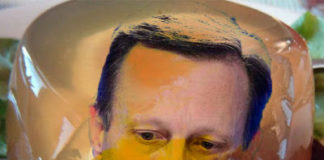“…a feature common to most drug ads: they leave you confused about the information,” says Kate Pickert, a Time Magazine reporter and author of the article “Do Consumers Understand Drug Ads?“
I’d say that that most drug ads leave me confused about how pharmaceutical companies view consumers and patients.
Take for example the cute ENABLEX TV ads that depict people as colorful urine-filled balloons. Is THAT how Novartis and P&G, marketers of ENABLEX, a treatment for overactive bladder, view people?
Here are images I captured from the ad (you can view the entire ad on http://www.enablex.com/): This certainly does not leave me confused about what happens when you have overactive bladder! It takes me back to my youth in summer throwing water balloons at passersby.
This certainly does not leave me confused about what happens when you have overactive bladder! It takes me back to my youth in summer throwing water balloons at passersby.
It also reminds me of a cartoon I did a long time ago for a health information booklet. It depicts how specialist physicians sometimes view patients’ medical problems only through their narrow specialist perspective.  The criticism is that the whole patient is not looked at. In the case of overactive bladder (OAB), for example, that symptom might be caused by a more serious problem that ENABLEX does not address. Here’s what the Mayo Clinic says may cause OAB symptoms:
The criticism is that the whole patient is not looked at. In the case of overactive bladder (OAB), for example, that symptom might be caused by a more serious problem that ENABLEX does not address. Here’s what the Mayo Clinic says may cause OAB symptoms:
“In many cases doctors can’t exactly identify overactive bladder causes. Neurological disorders, such as Parkinson’s disease or strokes, are often associated with overactive bladder.
“Several factors may cause or contribute to symptoms similar to those of overactive bladder and your doctor will try to rule out these during an evaluation, because these require other specialized treatments. These include:
- Urinary tract infection
- Inflammation of tissues near the urinary tract
- Abnormalities in the bladder, such as tumors
- Factors that obstruct bladder outflow (enlarged prostate, constipation, bladder stones, or previous operations to treat other forms of incontinence)
- Diabetes, which can cause excess urine production
- Excess consumption of caffeine or alcohol
- Medications that cause a rapid increase in urine production
That last one is interesting: you may be taking one drug to counteract the symptoms of another!









![6 Digital Tools at the Center of Healthcare Digitalization [INFOGRAPHIC]](http://ec2-54-175-84-28.compute-1.amazonaws.com/pharma-mkting.com/wp-content/uploads/2021/04/6DigitalTools_600px-100x70.jpg)




